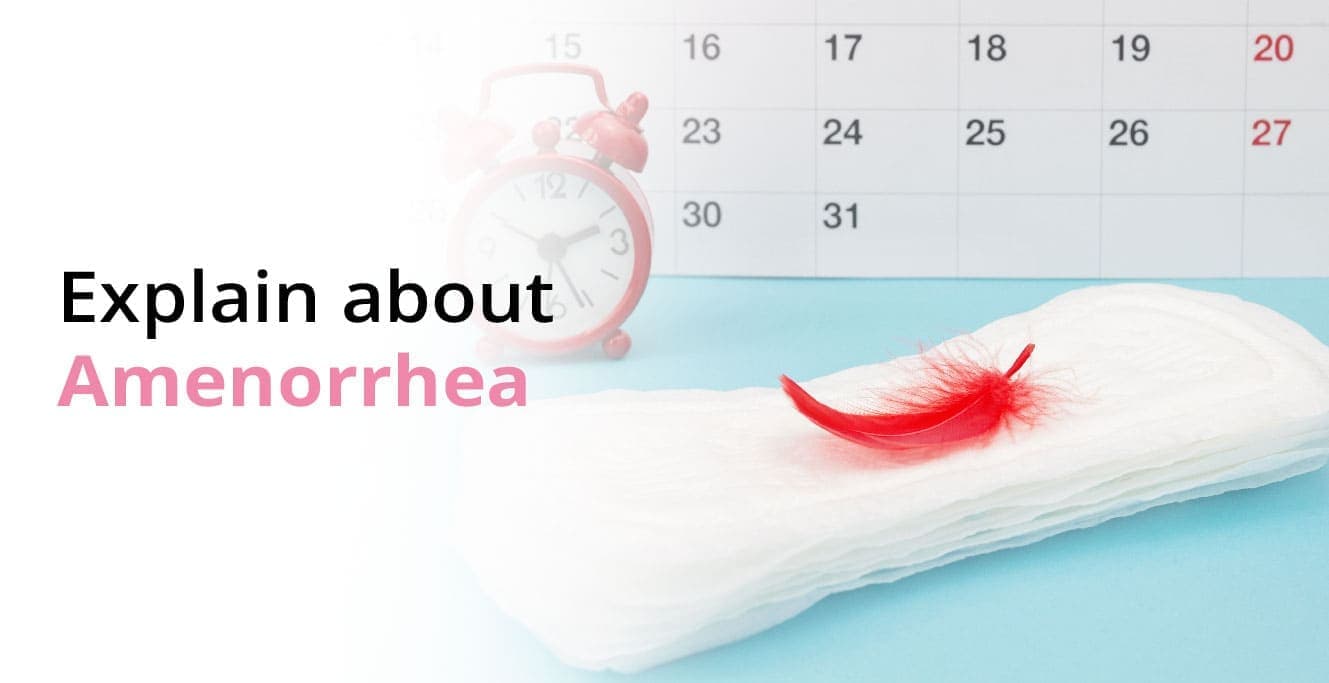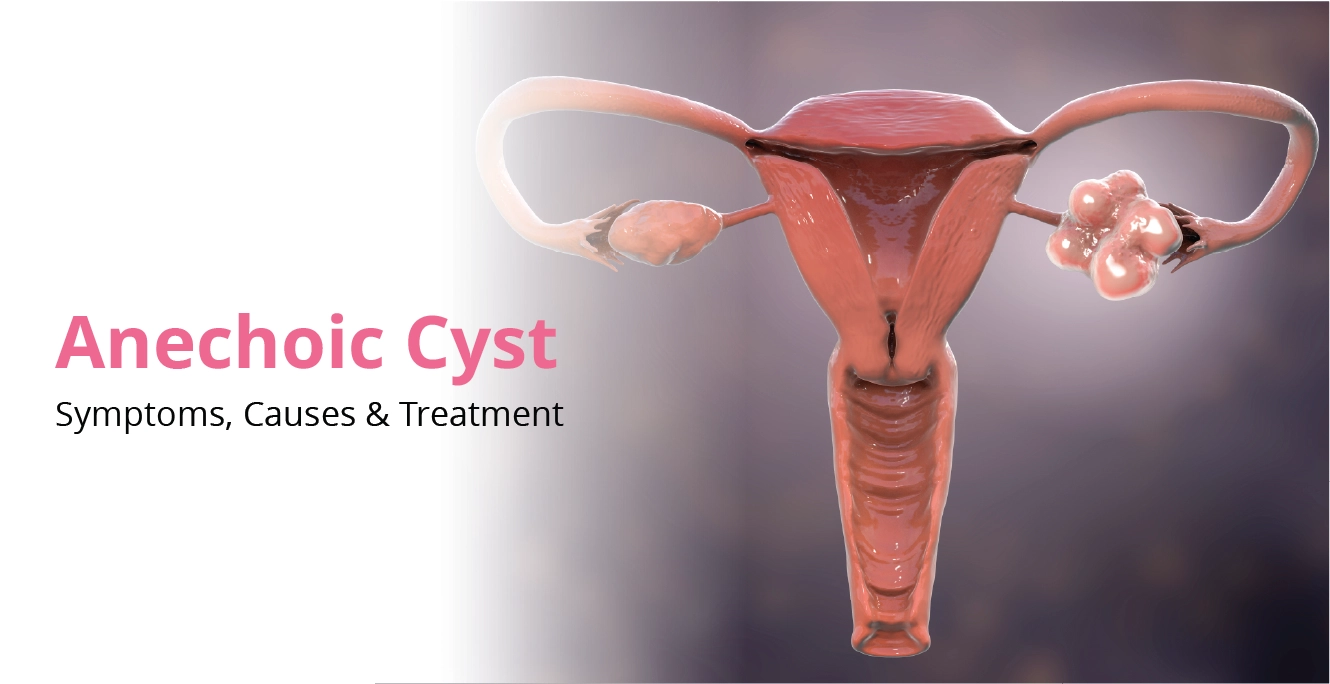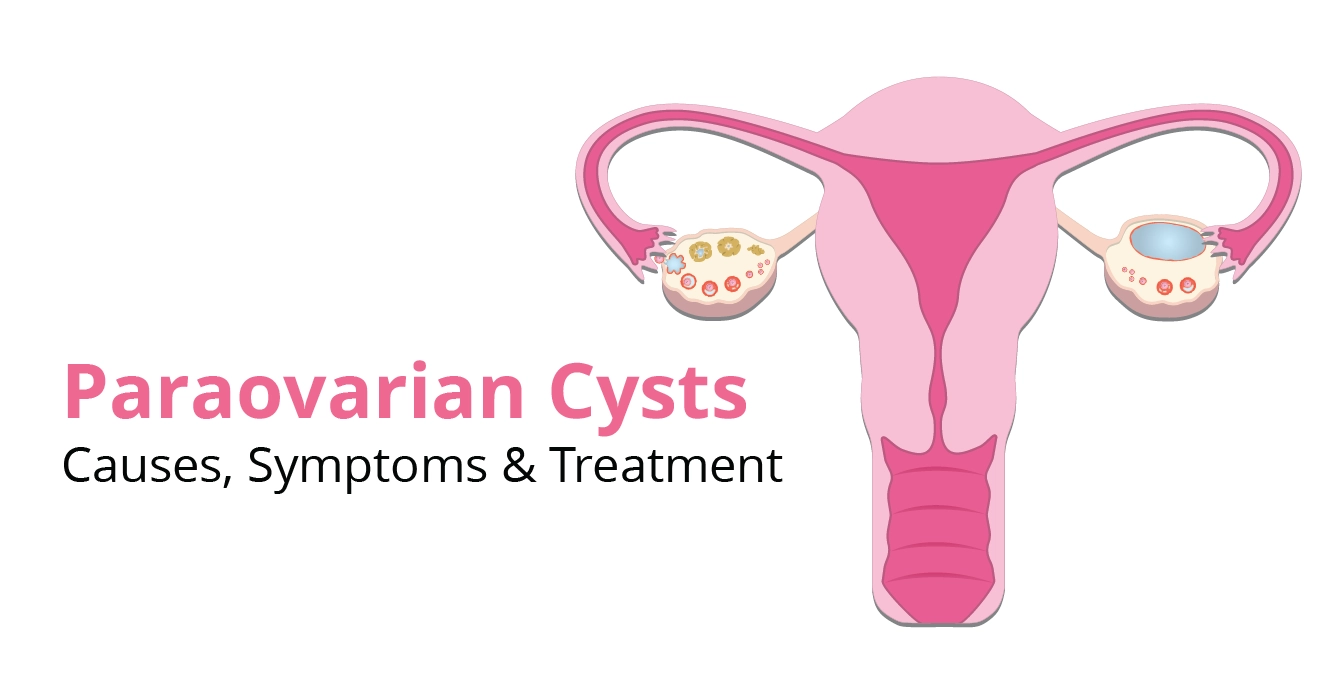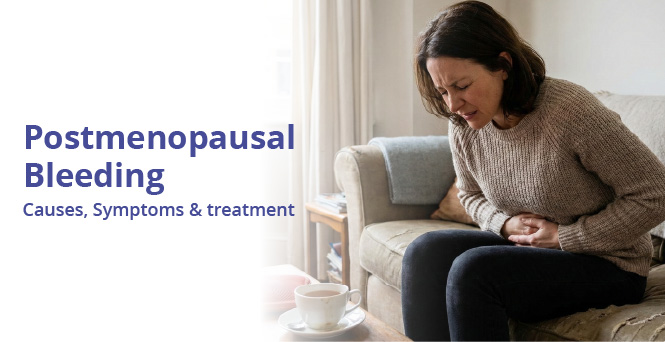
What is Amenorrhea? Symptoms, Causes and Treatment

Table of Contents
Missing periods can often feel confusing and unsettling; this condition is known as amenorrhea. Whether it lasts a few months or more, it does raise concerns about your general well-being, fertility, and health.
Amenorrhea can happen at different phases of a woman’s life, so even though it may make you feel lonely, you’re not alone. It is not dangerous, but it does indicate that your body needs attention. The first step would be to take charge of your health. It can be done by understanding the nitty-gritty of what amenorrhea is, why it is an issue, and how it can be treated. Most women may address the root problems and regain balance with the correct support, care, and treatment. There are many causes behind the same; however, they may vary from person to person. The most common cause is a hormonal imbalance. It is a treatable condition, and the treatment depends on the cause.
This blog will help you explore everything about amenorrhea.
Amenorrhea Symptoms
Apart from the missed menstruation cycle, there are some other symptoms as well. Here they are:
- Pain in the pelvis area
- Loss of hair
- Headaches
- Acne
- Changes in the vision
- Excess growth of hair on the face and body
- Hot flashes
- Milky discharge from the nipples
- Nausea
- Changes in the size of the breast
- In primary amenorrhea, there may be a lack of breast development.
Please note: It is not necessary to have all amenorrhea symptoms. Depending on the severity of the disease, you may experience a few or all of the symptoms.
Amenorrhea Types
There are two types of amenorrhea. They can be classified as primary and secondary amenorrhea.
Primary Amenorrhea
When a girl does not get a period by the age of 15-16 or within five years after she reaches puberty, it is known as primary amenorrhea. This happens due to changes in the organs, hormones, and glands responsible for or related to menstruation.
Secondary Amenorrhea
Secondary amenorrhea occurs when a woman who previously had regular periods misses them for at least three consecutive months. This may happen due to stress, an illness, or pregnancy.
| Type | Definition | Examples / Causes |
| Primary Amenorrhea | Menstruation never begins by age 15–16, or within 5 years after puberty starts. |
|
| Secondary Amenorrhea | Menstruation begins normally, then stops for ≥3 months (regular cycles) or ≥6 months (irregular cycles). |
|
Amenorrhea Myths & Facts
There are many myths around amenorrhea, but they are far from the truth. Let’s check them out:
Myth 1: Missing your period always means you are pregnant.
Fact: Wrong! While it can be one reason, amenorrhea can also be caused due to stress, hormonal imbalance, certain medical conditions, and more.
Myth 2: Amenorrhea is not a serious health issue.
Fact: Even though it is not life-threatening when detected, that doesn’t mean that you should neglect it. When amenorrhea is left untreated, it can lead to complications in the future, like infertility, weak bones, and more. Hence, one must always consult a doctor when diagnosed.
Myth 3: Only older women face amenorrhea.
Fact: It is absolutely not true since amenorrhea can affect women at different ages during their reproductive years.
Let’s understand the causes of amenorrhea in detail in the next section.
Amenorrhea Causes
Amenorrhea causes differ based on the types of amenorrhea.
Causes of primary amenorrhea:
- Hereditary: If the women in your family have a history of delayed menstruation, then there is a high chance you might also face the same issue.
- Genetic conditions: There are certain genetic conditions that also result in amenorrhea. They are:
-
- Turner Syndrome (a chromosomal defect)
- Mullerian defects (malformation of the reproductive organs)
- Androgen insensitivity syndrome (leads to high levels of testosterone)
- Structural abnormality: There can be abnormalities in the genitals or reproductive organs.
- Hormonal issues: These can be due to problems with the hypothalamus or the pituitary gland
Causes of secondary amenorrhea:
- Pregnancy
- Breastfeeding
- Menopause
- Oral contraceptive pills (OCPs): Occasionally, regular ovulation and menstruation may take some time to resume even after OCPs are stopped.
- Certain Intra-uterine Devices (IUDs)
- Medications: Certain medications can also cause amenorrhea, such as:
- Drugs for blood pressure
- Allergy medications
- Chemotherapy drugs for cancer
- Antidepressants
- Antipsychotics
- Radiation therapy for cancer
- Uterine scarring: In this, scar tissue builds up in the inner lining of the uterus. This sometimes happens after a dilation and curettage (D&C), caesarean section, or treatment for uterine fibroids. This prevents the normal buildup and shedding of the uterine lining, disrupting menstruation.
- Lifestyle factors: A number of lifestyle factors are responsible for secondary amenorrhea. They are:
- Low body weight: Serious weight loss, typically with a body mass index (BMI) of less than 19, can cause ovulation. It can result in menstruation stopping.
- Stress: Stress alters the functioning of the hypothalamus, which is responsible for controlling the hormone that regulates your menstrual cycle.
- Too much exercise: Rigorous exercise leads to low body fat, stress, and high energy expenditure and results in disturbed menstrual cycles.
- Hormonal disorders: Some hormonal disorders can also lead to secondary amenorrhea, such as:
- Thyroid malfunction: hypothyroidism or hyperthyroidism
- Polycystic Ovarian Syndrome (PCOS): Causes relatively high and sustained levels of certain hormones.
- Pituitary tumour: A benign tumour in the pituitary gland.
- Premature menopause/ Primary ovarian insufficiency: When you experience menopause at the age of 40
- Adrenal disorders
- Hypothalamus disorders
Diagnosis of Amenorrhea
To determine the underlying cause of the absence of menstrual cycles, a thorough medical evaluation is required.
The steps in the amenorrhea diagnosis generally include:
Medical History:
The first step in diagnosis involves reviewing the medical record of the patient and getting a thorough medical history from the patient. This will include details like:
- The patient’s menstrual history
- The age at which puberty began
- Previous menstrual patterns
- Any recent changes to their weight or exercise routines
- Any other medical conditions
Physical Examination:
A thorough physical assessment will be performed by an expert to determine the patient’s overall health, including:
- Body weight
- Distribution of body fat
- Any abnormal findings in the pelvic area
- Signs of androgen excess (such as excessive hair growth)
Evaluation of Hormones:
Next, blood tests will be done to determine hormone levels. These include:
- Elevated follicle-stimulating hormone (FSH): This helps understand the levels that may be a sign of menopause or primary ovarian failure.
- Luteinizing hormone (LH): If the levels are out of the ordinary, then it can mean ovulation and hormonal abnormalities.
- Thyroid hormones: Since amenorrhea can be caused by thyroid dysfunction, thyroid hormone levels (TSH, T3, and T4) will be examined.
- Prolactin: It will be evaluated since high prolactin levels can cause amenorrhea.
Imaging investigations:
Imaging tests may generally be carried out to see the reproductive organs and find any structural abnormalities in the body, specifically in the pelvis region. This may consist of:
- Ultrasound: To check for any anomalies in the uterus, ovaries, and other pelvic organs.
- MRI or CT scan: These imaging procedures can offer more in-depth knowledge about the genitalia and the pituitary gland, which is essential in controlling menstruation.
Tests for Ovarian reserve:
Diagnostic tests to evaluate ovarian reserve, such as the antral follicle count and anti-Müllerian hormone (AMH) levels, may be performed on women suspected of experiencing premature ovarian failure.
Progestin Challenge Test:
A progestin challenge test may be carried out when the reason for amenorrhea is uncertain. This entails taking progestin medicine for a few days and then keeping an eye out for withdrawal bleeding, which can show healthy oestrogen levels and an intact uterus.
Genetic screening:
It is usually advised in some circumstances to look for any chromosomal or genetic anomalies connected to amenorrhea.
Amenorrhea Treatment
Depending on the underlying cause, amenorrhea treatment options might vary from hormonal drugs to surgical procedures following a comprehensive diagnostic evaluation. After treating amenorrhea, the specialist will decide on the best method for achieving successful outcomes. Among the techniques used to treat amenorrhea are:
Hormonal Therapies:
- Birth control: Combination oral contraceptives are frequently administered to women whose amenorrhea is brought on by hormonal abnormalities, such as polycystic ovary syndrome (PCOS) or dysfunction of the hypothalamus. Oral contraceptives that include oestrogen and progestin can regulate hormone levels and trigger regular menstrual cycles.
- Progestin Therapy: In some situations, women with secondary amenorrhea brought on by anovulation or irregular cycles may be offered progestin-only drugs to encourage uterine lining shedding and initiate monthly flow.
Hormone Replacement Therapy(HRT):
HRT may be advised for women who experience primary or secondary amenorrhea due to menopause or early ovarian failure. In HRT, oestrogen and progesterone are given to imitate the hormonal balance that prevails during the reproductive years.
Medication:
The expert may advise a few medications and fertility drugs to stimulate the ovaries for normal function.
Some of the common fertility drugs that are generally advised during amenorrhea treatment are:
- Clomiphene Citrate: This is usually prescribed to women with amenorrhea brought on by PCOS or other ovulatory problems; the hormones that cause ovulation are stimulated to release when clomiphene citrate is taken.
- Human Chorionic Gonadotropin(HCG): In some instances, women who do not respond to clomiphene citrate or who have other fertility concerns use hCG injections to trigger ovulation.
Surgical Procedures:
In some cases, an expert may advise surgical intervention based on the severity of the condition. Some of the surgical techniques involve:
- Ovarian drilling: It is an alternative method for surgical treatment advised to patients with PCOS in order to control insulin resistance. This helps in lowering the levels of androgen (male hormone) production and increases ovulation. Tiny holes are created in the ovaries using heat or lasers.
- Uterine Surgery: Amenorrhea may be brought on by structural issues with the uterus, such as uterine adhesions or fibroids. Surgery can be used in these situations to resolve these problems and restore menstrual function.
Psychological Support:
Amenorrhea can also be influenced by emotional and psychological factors. Therapy or counselling may be helpful for some women in resolving emotional problems associated with amenorrhea and fostering a positive outlook.
Complications of Untreated Amenorrhea
If amenorrhea is left untreated, it can result in complications that can worsen the situation:
- Infertility: One of the most common consequences is that irregular or absent ovulation prevents conception. It can become one of the prime reasons for infertility in women.
- Bone Health Issues: Low estrogen levels associated with amenorrhea can lead to decreased bone density, increasing the risk of osteoporosis and fractures.
- Cardiovascular Problems: Hormonal imbalances may affect heart health, potentially increasing the risk of heart disease over time.
- Endometrial Problems: If periods do not come for consecutive 6 months, then it can cause the uterine lining to thin or develop abnormalities. This increases the risk of endometrial complications.
- Metabolic Issues: Untreated amenorrhea can be associated with insulin resistance and weight fluctuations, potentially leading to metabolic disorders like diabetes.
- Emotional and Mental Health Effects: Chronic hormonal imbalance can contribute to mood swings, anxiety, and depression, affecting overall quality of life.
- Delayed Diagnosis of Underlying Conditions: Amenorrhea may be a symptom of thyroid disorders, polycystic ovary syndrome (PCOS), or pituitary gland issues; leaving it untreated can delay essential medical intervention.
Diet & Lifestyle Tips for Managing Amenorrhea
In mild cases, the doctor will recommend some diet and lifestyle modifications in order to increase the quality of life and to improve the symptoms of amenorrhea:
- Weight Management: Hormonal balance depends on maintaining a healthy weight. Gaining weight or cutting back on strenuous exercise may help restore regular menstrual periods in women who have amenorrhea as a result of excessive exercise or low body weight.
- Stress management: Excessive stress might interfere with the hormonal system that regulates menstruation. For women with amenorrhea brought on by stress-related issues, stress reduction treatments like meditation, yoga, or counselling may be helpful.
- Balanced Nutrition: Consuming a nutrient-rich diet with adequate proteins, healthy fats, and complex carbohydrates supports hormone production and overall reproductive health. Include leafy greens, nuts, seeds, dairy, and whole grains in your diet.
- Adequate Sleep: Proper sleep is essential for maintaining hormonal balance. Aim for 7–8 hours of quality sleep daily, as irregular or insufficient sleep can worsen amenorrhea symptoms.
- Limit Stimulants & Processed Foods: Reduce intake of caffeine, alcohol, and highly processed or sugary foods, as they can disrupt hormonal function and negatively affect menstrual cycles.
Takeaway
To identify the underlying cause and create a suitable treatment plan, it is imperative for women who are experiencing amenorrhea to speak with an expert specialist for effective and suitable treatment. Though amenorrhea is not life-threatening, it can lead to increased risks and complications over time. This condition can lead to infertility, cause problems with pregnancy, cardiovascular diseases, and osteoporosis. It can also cause psychological stress, especially in adolescence, since it is a transitional age. Hence, early intervention is required to manage the condition and prevent any further complications.
If you are struggling with primary or secondary amenorrhea, feel free to reach out to our healthcare experts at Birla IVF & Fertility. Our doctors are well-qualified and address the issues of the patient with empathy.
FAQs:
What Medications Treat Amenorrhea?
Birth control pills are provided for amenorrhea treatment. Iron supplements, multivitamins, calcium, etc., are also given to treat amenorrhea.
What is the First Line of Treatment for Amenorrhea?
Hormonal medications are the mainstay of amenorrhea treatment. However, additional medications may be needed to treat the underlying cause.
How Can I Get My Periods Back From Amenorrhea?
Consulting your healthcare provider is a must, as there are multiple causes of amenorrhea. Proper diagnosis and treatment are required to bring your periods back.
What is the Main Cause of Amenorrhea?
Pregnancy is the most common cause of secondary amenorrhea. Although problems with hormones are also a major cause.
What is the difference between amenorrhea and oligomenorrhea?
The total lack of menstrual cycles, whether primary (never beginning) or secondary (ending after starting), is known as amenorrhea. On the other hand, irregular menstrual cycles, typically with intervals longer than 35 days, are referred to as oligomenorrhea.
Can Amenorrhea Cause Infertility?
Yes, if amenorrhea is left untreated, it can cause infertility.
What is lactational amenorrhea?
The normal lack of menstruation following childbirth as a result of breastfeeding is known as lactational amenorrhea. It happens when ovulation is suppressed by high levels of prolactin, the hormone that produces milk. If exclusive breastfeeding is followed for the first six months after giving birth, this can serve as a temporary form of contraception.
Our Fertility Specialists
Related Blogs
To know more
Birla Fertility & IVF aims at transforming the future of fertility globally, through outstanding clinical outcomes, research, innovation and compassionate care.
Had an IVF Failure?
Talk to our fertility experts

 Our Centers
Our Centers



















